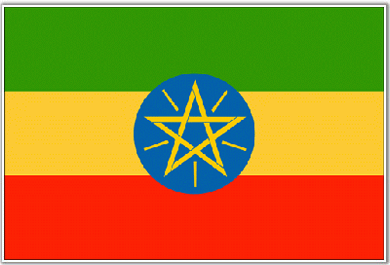|
| |
 |
Ethiopia |

The designations employed and the presentation of material in this publication do not imply the expression of any opinion whatsoever on the part of the Food and Agriculture Organization of the United Nations concerning the legal status of any country, territory, city or area or of its authorities, or concerning the delimitation of its frontiers or boundaries.
The Federal Democratic Republic of Ethiopia covers a total area of 1,104,300 km2 between latitudes 3°30´N and 18°N and longitudes 33°E and 48°E in the north-eastern horn of Africa . It is bounded on the north-east by Eritrea and Djibouti, on the east and south-east by Somalia, on the south-west by Kenya and on the west and north-west by Sudan.
The heart of the country is formed by a vast mountain mass between 2,100 and 2,500 m in altitude with some peaks rising above 4,000 m. Ras Dashen is the highest point at 4,620 m. The massif is divided into two plateaus - the Central Ethiopian and Galla-Somali- separated by the Rift Valley, in which lie several lakes in the south and the Awash River in the north, a river vital for the irrigation of the extensive plains leading to the Red Sea and Somalia.
Although the entire country lies within the tropics, only the lowlands have a hot climate. In the lowlands, climates range from dry semi-desert in the plains to humid and tropical in the deep valleys. In the highlands, however, the proximity of the equator is counterbalanced by the elevation of the land, resulting in temperate conditions. The high mountains are characterised by a cold, alpine climate.
Average temperatures in the hot lowlands vary between 20°C and 29°C, in the temperate highlands between 16°C and 20°C and in the mountains between 10°C and 16°C. The relative humidity, which is very low on the eastern and western plains, increases on the plateaus from 20 percent in the north up to 80 percent in the south. The precipitation increases from 200 mm in the north and on the eastern plains to 1,600 mm in the south-west. The rainy season occurs between mid-June and September, followed by a dry season that may be interrupted in February or March by a short rainy season.
Ethiopia harbours some secondary breeding areas mainly during the summer season along the wadis in Dire Dawa, Somali, Afar and Tigray regions on roughly 300,000 – 400,000 ha and to a lesser extent during the spring and winter breeding seasons in the areas of Somali and Dire Dawa.
Desert Locust management in Ethiopia is decentralised under the supervision and guidance of the Plant Protection Division under the Crop Protection Department of the Ministry of Agriculture and Rural Development in Addis Ababa. The Plant Protection Division is handling all migratory pest matters and is operating a Locust Information Office, equipped with a modern data management system, Reconnaissance and Management System of the Environment of Schistocerca (RAMSES). All locust survey and control operations initiated by the Federal Department in Addis Ababa are carried out in close collaboration with the regional Crop Protection Departments and Plant Health Clinics mainly those in Jijiga, Shinile, Dire Dawa, Asebe Teferi, Deba, Measo, Harer, Alemaya and Meta.
|
Recent News
|
|
Resources
|
|
Bulletins
|
| |
| Ministry of Agriculture and Natural Resources - Plant Protection Directorate |
Address |
P.O. Box 62347 - Addis Ababa, Ethiopia |
 |
| Tel |
|
| Fax |
|
| E-mail |
|
Website
|
|
| Contact Person: WEDEHAWARIAT, Assefa Fesseha |
| Title | Director General of Plant Health and Regulatory Directorate
|  |
| Tel | (+251) 116 462417, (+251) 914746348 (Mob)
|
| Fax | (+251) 116 462311
|
| E-mail | hapruassefa2@gmail.com
|
Website
|
|
| Alternative Conatct: Zebdewos Amba |
| Title | Head of National Desert Locust Unit
|  |
| Tel | (+251) 116461147, (+251) 911922499 (Mob)
|
| Fax | (+251) 116462311
|
| E-mail | zebdewosalato@yahoo.com
|
Website
|
|
|
|
|
|